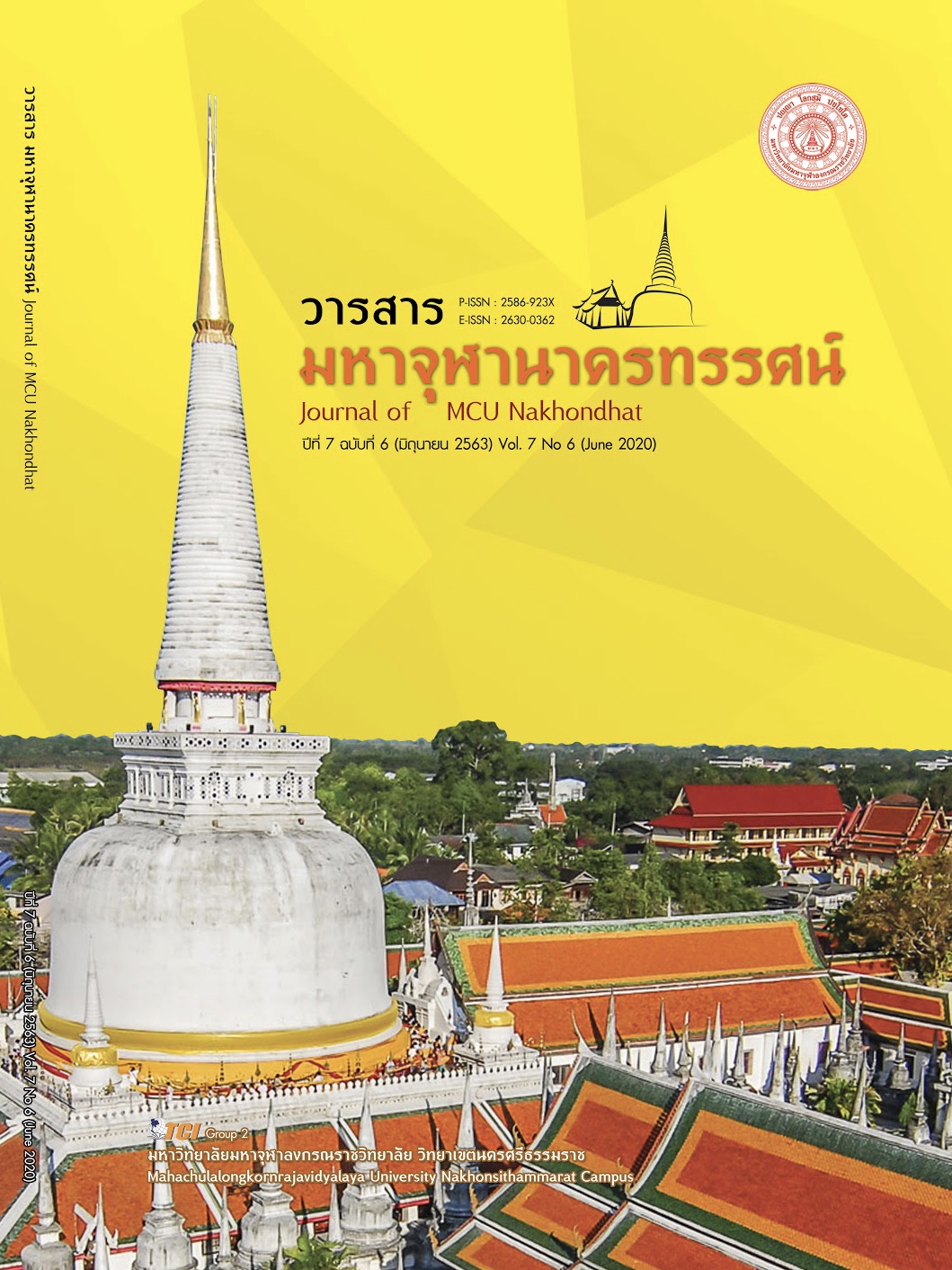THE DEVELOPMENT OF PROBLEM SOLVING ABILITY OF MATHAYOMSUKSA 5 STUDENTS BY USING METACOGNITION METHOD
Main Article Content
Abstract
The action research aim to develop problem – solving ability using the Metacognition method in order to pass the criteria of 70% of full score. The target group of this study contained of 11 Mathayomsuksa 5 students. The targets are 11 students from a Mathayom Suksa 5, which were purposive sampling from 29 students in the same classroom, after problem – solving ability test. The instruments used in the research were 1) 3 sets of the problem – solving ability test, 2) observation form in students problem solving, 3) the semi – structure interview and 4) 10 plans for integrated with the Metacognition method in Physics take time with 15 hours. The classroom action research consisted of 3 cycles each one; planning, action observing and reflection. Whereas action research approach used in this study composed of 3 spiral, which the first spiral used for the first to the third plan, the second spiral used for the fourth to the seventh plan, and the third spiral used for the eighth to the tenth plan. The ability test is used after each cycle. The statistics using for data analysis is mean and percentage.
The result from classroom action research revealed that: The target students who learning using Metacognition method were obviously higher in the problem – solving ability of 11 students raised from 65.57 in the first loop to 68.43 in the second loop and up to 79.85 in cycle 3 in the percentage. It showed that the using Metacognition Method can develop the ability of students.
Article Details
References
กระทรวงศึกษาธิการ. (2551). การจัดสาระการเรียนรู้กลุ่มสาระการเรียนรู้วิทยาศาสตร์. กรุงเทพมหานคร: โรงพิมพ์คุรุสภาลาดพร้าว.
กุญชรี ค้าขาย. (2540). จิตวิทยาการเรียนการสอน. กรุงเทพมหานคร: คณะครุศาสตร์สถาบันราชภัฏสวนสุนันทา.
ชัยวัฒน์ สุทธิรัตน์. (2552). 80 นวัตกรรมการจัดการเรียนรู้ที่เน้นผู้เรียนเป็นสำคัญ. (พิมพ์ครั้งที่ 2). กรุงเทพมหานคร: แดแน็กซ์ อินเตอร์คอร์ปอเรชั่น.
ทิศนา แขมมณี. (2548). ศาสตร์การสอน. กรุงเทพมหานคร: สำนักพิมพ์จุฬาลงกรณ์มหาวิทยาลัย.
ประพันธ์ศิริ สุเลารัจ. (2541). คิดเก่ง สมองไว. กรุงเทพมหานคร: โปรดัคทีฟบั๊ค.
ประสาท เนืองเฉลิม. (2556). วิจัยการเรียนการสอน. (พิมพ์ครั้งที่ 1). กรุงเทพมหานคร: สำนักพิมพ์แห่งจุฬาลงกรณ์มหาวิทยาลัย.
พิมพันธ์ เตชะคุปต์. (2544). เมตาคอกนิชัน (Metacognition) ในวิทยาการด้านการคิด. กรุงเทพมหานคร: เดอะมาสเตอร์กรุ๊ป แมเนจเม้นท์ จำกัด.
วิจารณ์ พานิช. (2555). วิถีสร้างการเรียนรู้เพื่อศิษย์ในศตวรรษที่ 21. กรุงเทพมหานคร: มูลนิธิสดศรีสฤษดิ์วงศ์.
วินิจฉัย ไชยขันธ์. (2550). การใช้ยุทธศาสตร์เมตาคอกนิชันในการพัฒนาทักษะการเรียนรู้วิชาเคมีของนักเรียนชั้นมัธยมศึกษาปีที่ 5. ใน วิทยานิพนธ์ศึกษาศาสตรมหาบัณฑิต สาขาวิทยาศาสตร์ศึกษา. มหาวิทยาลัยขอนแก่น.
ศรีสุมา ทัศมี. (2552). การพัฒนากิจกรรมการเรียนรู้วิชาฟิสิกส์ เพื่อพัฒนาความสามารถในการแก้โจทย์ปัญหา โดยใช้เมตาคอกนิชัน สำหรับนักเรียนชั้นมัธยมศึกษาปีที่ 4 โรงเรียน พังโพนวิทยาคม อำเภอพังโพน จังหวัดสกลนคร. ใน วิทยานิพนธ์ศึกษาศาสตรมหาบัณฑิต สาขาวิทยาศาสตร์ศึกษา. มหาวิทยาลัยขอนแก่น.
สถาบันส่งเสริมการสอนวิทยาศาสตร์และเทคโนโลยี. (2546). คู่มือการจัดการเรียนรู้กลุ่มสาระการเรียนรู้วิทยาศาสตร์หลักสูตรการศึกษาขั้นพื้นฐาน. กรุงเทพมหานคร: โรงพิมพ์คุรุสภาลาดพร้าว.
สมนึก ภัททิยธนี. (2549). พื้นฐานการวิจัยการศึกษา. (พิมพ์ครั้งที่ 3). กาฬสินธุ์: ประสานการพิมพ์.
สุขสันต์ บัวสาย. (2551). ผลการสอนโดยวิธีสืบเสาะหาความรู้สอดแทรกเมตาคอกนิชันที่มีต่อผลสัมฤทธิ์ ทางการเรียนวิชาเคมี เรื่องสมดุลเคมี ของนักเรียนชั้นมัธยมศึกษาปีที่ 5 โรงเรียนคลองน้ำใสวิทยาคาร จังหวัดสระแก้ว. ใน วิทยานิพนธ์ศึกษาศาสตรมหาบัณฑิต สาขาวิชาหลักสูตรและการสอน. มหาวิทยาลัยสุโขทัยธรรมาธิราช.
Baker, L. & Brown, A. L. (1984). Metacognition Skill and Reading: Handbook of Reading Research. New York: Longman.
Guilford, J. P. (1992). The Nature of Human Intelligence. New York: McGraw-Hill.
Kemmis, S. & McTaggart, R. (1992). The Action Research Planner. (3rd ed.). Geelong: Deakin University Press.
Woolfolk, A. E. & Hoy, W. K. (1990). Prospective Teachers’ Sense of Efficacy and Beliefs about Control. Journal of Educational Psychology, 82, 81-91.


